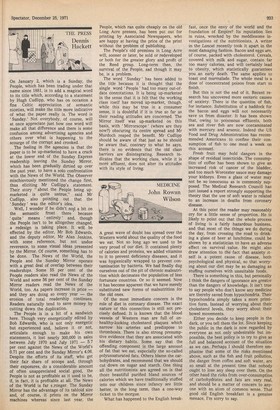MEDICINE
John Rowan Wilson
A great wave of doubt has spread over the Western world about the quality of the food we eat. Not so long ago we used to be very proud of our diet. It contained plenty of calories and proteins, we added vitamins to it to prevent deficiency diseases, and it was hygienically wrapped to prevent contamination by bacteria. We had finally dug ourselves out of the pit of chronic malnutrition which decimates the population of less fortunate countries. Or so it seemed. Now it has become apparent that we have merely substituted new forms of malnutrition for the old ones.
Of the most immediate concern is the role of diet in coronary disease. The exact nature of this connection is still not precisely defined. It is known that the blood vessels of Western man are full of unhealthy-looking cholesterol plaques which narrow his arteries and predispose to thrombosis. There is also strong presumptive evidence that they are associated with his dietary habits. Some say that the offending component is the large amount of fat that we eat, especially the so-called polyunsaturated fats. Others blame the carbohydrates, and recommend that we should cut down on sugar and starch. One thing all the nutritionists are agreed on is that those beautiful purified bland sources of calories which we have traditionally stuffed into our children since infancy are little better, in the long term, than a one-way ticket to the morgue.
What has happened to the English break fast, once the envy of the world and the foundation of Empire? Its reputation lies in ruins, wrecked by the meddlesome investigations of the nutritionists. A writer in the Lancet recently took it apart in the most damaging fashion. Bacon and eggs are, of course, packed with cholesterol. Cereals, covered with milk and sugar, contain far too many calories, and will certainly lead to obesity, which statistically guarantees you an early death. The same applies to toast and marmalade, The whole meal is a dose of concentrated poison from start to finish.
But this is not the end of it. Recent research has uncovered more esoteric causes of anxiety. There is the question of fish, for instance. Substitution of a haddock for the bacon and eggs will not necessarily save us from disaster. It has been shown that, owing to poisonous effluents, both sea and river fish are now contaminated with mercury and arsenic. Indeed the US Food and Drug Administration has recommended Americans to confine their consumption of fish to one meal a week on this account.
Fresh fruit may hold dangers in the shape of residual insecticide. The consumption of coffee has been shown to give an increased risk of cancer of the bladder, and too much Worcester sauce may damage your kidneys. Even a glass of water may not be so innocuous as is commonly supposed. The Medical Research Council has just issued a report strongly supporting the theory that the use of soft water is related to an increase in deaths from coronary disease.
At this point the reader may reasonably cry for a little sense of proportion. He is likely to point out that the whole process of living is a fairly hazardous business, and that most of the things we do during the day, from crossing the road to drinking a glass of beer at lunchtime, could be shown by a statistician to have an adverse effect on survival value. He might also draw attention to the' fact that anxiety itself is a potent cause of disease, both psychological and physical, so that worrying about our diet may be as damaging as stuffing ourselves with unsuitable foods.
There is something in this, but personally I think the dangers of ignorance are greater than the dangers of knowledge. It isn't true to say people who don't know any medicine are thereby saved from hypochondria. Their hypochondria simply takes a more primitive form. Instead of worrying about their cholesterol levels, they worry about their bowel movements.
Either you decide to keep people in the dark, or you tell them the lot. Since keeping the public in the dark is now regarded by everyone as not only undesirable but impossible, the best policy is to try to give as full and balanced account of the situation as we can. Perhaps I should therefore emphasise that some of the risks mentioned above, such as the fish and fruit pollution, the danger from coffee and soft water, are so small at the present time that nobody ought to lose any sleep over them. On the other hand the risks from over-consumption of carbohydrates and fats are very real, and should be a matter of concern to anyone with an atom of common sense. That good old English breakfast is a genuine menace, I'm sorry to say.










































 Previous page
Previous page